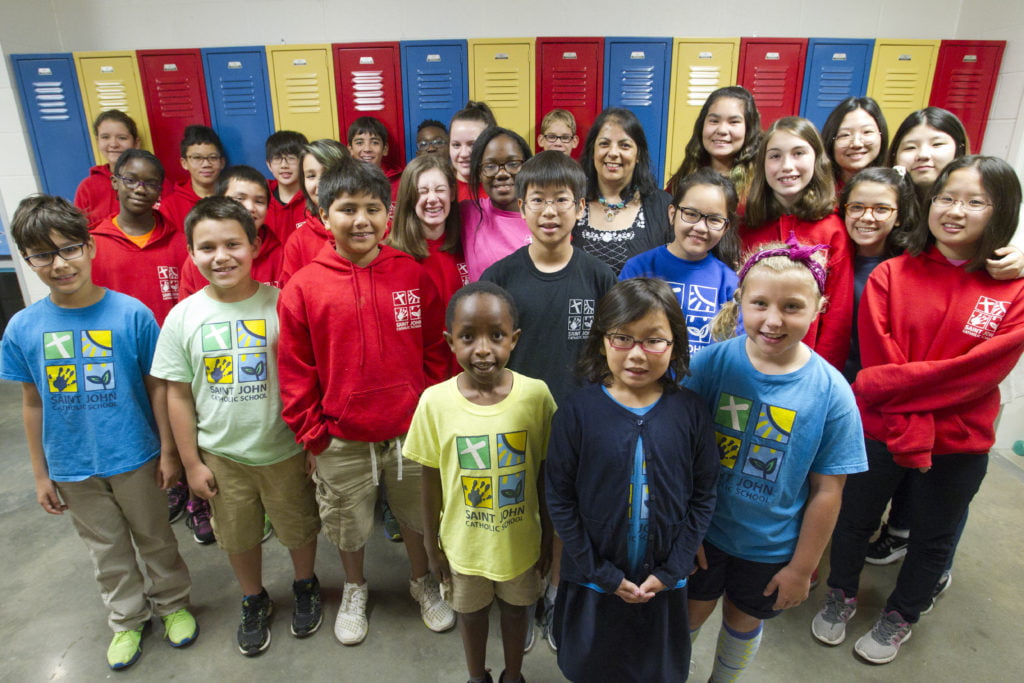
Students at St. John the Evangelist School in Lawrence come from all over the world, including the continents of South America, Africa, Europe and Asia. Some of the students now call Lawrence home, while some are in Lawrence for just the year. LEAVEN PHOTO BY JAY SOLDNER
by Doug Weller
Special to The Leaven
Lawrence — Some schools talk a lot about diversity.
St. John the Evangelist School in Lawrence lives it.
It is not just that Spanish is taught from preschool through eighth grade.
Or that students proudly share that they were born in another country, or that their parents were.
It’s that the administration both invites diversity and encourages students to share their cultures with others.
“We’ve worked very purposely to attract Spanish-speaking students, especially students whose parents came from Spanish-speaking countries,” said principal Patricia Newton.
And while most of those students are from Mexico, children from Central and South America, Europe, Africa and Asia also attend the school sponsored by St. John the Evangelist Parish. Students born in another country or whose parents were born elsewhere, in fact, account for 18 percent of St. John’s enrollment.
“The diversity really makes it special here. Everyone knows someone who speaks Spanish,” said Claudia Olea, a Chilean native who has taught Spanish at the school for 10 years.
Native English speakers are encouraged to attend a Spanish Mass, cultural events like the feast day of Our Lady of Guadalupe, the patron saint of the Americas, or El Día de los Muertos (“Day of the Dead”) celebration, when Mexican Catholics remember their ancestors and pray for the souls of the deceased.
“I don’t have to convince them that Spanish is useful,” Olea said. “They see it.”
The school’s effort to expose students to a variety of cultures doesn’t end with Latin America.
In the upper grades, volunteers teach six-week segments of French, German, Latin and Mandarin.
Parents have supported the offerings, and the approach often is the “selling point” when families are trying to decide whether to try a parochial education, the principal said.
It was Olea, in fact, who — as a parent — first suggested that a foreign language be taught. With Newton’s blessing, Olea began a before-school Spanish club.
When other parents suggested a foreign language be part of the curriculum, Newton told them there wasn’t enough funding to hire a teacher.
Until there was.
Parents raised enough money to pay Olea to teach Spanish part time.
“Now she’s full time and teaches Spanish from preschool through eighth grade. By the time students get to high school, they’re ready for Spanish II,” Newton said.
Not only do native English speakers get a head start on a foreign language, but Spanish-speaking students learn to read and write in Spanish, something many have not had the opportunity to do, said Olea.
It takes more than teaching Spanish to encourage Hispanic families to enroll their children, however. Spanish-speaking families moving to Lawrence were attending St. John’s Spanish Mass, but sending their children to public schools, Newton said.
“Because of the language and cultural barriers,” she said, “some of the parents couldn’t advocate for their kids if there was a problem.
“We tried to reach out, and the word got out that we would be open and helpful.”
Most importantly, she believes, is her philosophy that their cultural differences should be embraced, not pushed aside, as they become part of American society.
“I told them that speaking Spanish at home is a good thing. Give them all your culture and history and knowledge,” Newton said. “They’ll learn English at school.
“If you follow that, you raise children who are fully bilingual and bicultural. Everyone is better off if we can do that.”
That philosophy has attracted other families from around the world, many who come to Lawrence because of the University of Kansas — either to teach or to study.
“I love that it’s not just a Spanish community,” Olea said. “They get to know kids from all over the world. The majority are Catholic, but we have students from other religions.”
Father Jeff Ernst, a Capuchin Franciscan, is pastor of St. John Parish and an ardent supporter of the diversity initiative. He is fluent in Spanish, which he previously used when ministering in inner-city Denver, where his Capuchin province is based.
Here, he has a native Spanish speaker on staff who oversees religious education in Spanish for both children and adults and incorporates their traditions during the reception of the sacraments.
Father Jeff said Lawrence tends to be “very open to begin with,” which has helped the parish and school embrace new residents.
But Olea said it also is the Capuchins’ charism of serving missions and marginalized communities that has helped the parish and school successfully open its doors.
“It’s our community, church and Lawrence, but it’s also the Capuchin Franciscans. They encourage that,” she said.
The principal said the school’s philosophy produces well-rounded students who can help change the world.
“It’s just treating people with respect,” said Newton. “If we can teach these 300 kids that, and they teach 300 kids . . . think what we could do.”






